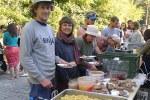News
The Alps as cultural laboratory
The Alps are a mosaic of stories, people and traditions. In his opening speech at the “Alpine Cultural Workshop”, Giovanni Netzer called for “the opportunities of the Alpine region to be seized and people to be encouraged to make use of the great freedom of these regions”. Netzer, artistic director of the theatre festival Origen in Riom/CH, creates culture in a peripheral region of Graubünden, beyond the established spaces and outside the usual cultural institutions. “Theatrically distant spaces”, such as those offered by the Alps, make new approaches possible.
Environment intertwined with culture
Why would an environmental organisation like CIPRA want to address the issue of “culture”? This question was answered by Katharina Conradin, President of CIPRA International: “Culture is the basis upon which we identify with our environment”. It is only by identifying with something – for example a beautiful landscape – that people are prepared to commit themselves to it. Cultural manager Špela Mrak from Tolmin/SI stressed that culture is an important building block for the future that increases the quality of life for the population: “Culture does not exclude anyone – or at least should try not to exclude anyone”. "In addition to artistic value, culture can also create social and human value." Roberto Canu from Bardonecchia/I spoke out in favour of overcoming aesthetic reductionism: "In this way culture can provide answers to the classical problems of well-being: such as integration, impairment, population ageing and health issues. This means cultural well-being. This means social innovation.”
Shaping culture
The six afternoon workshops offered participants the opportunity to deepen their knowledge: in some cases they were able to enjoy culture themselves, or even help shape it, for example by taking a walk in the Alps to sharpen their perceptions of the landscape, by practising handicrafts and questioning Alpine clichés, or reading literature on the Gotthard myth. A further workshop dealt with building heritage using the example of empty houses of miners in Idrija, Slovenia. Ideas were developed on how this potential could be used for crafts and culture and adapted to the needs of the 21st century. Museums as places of cultural mediation and Alpine food culture were also discussed.
More information: www.cipra.org/en/ac2019




